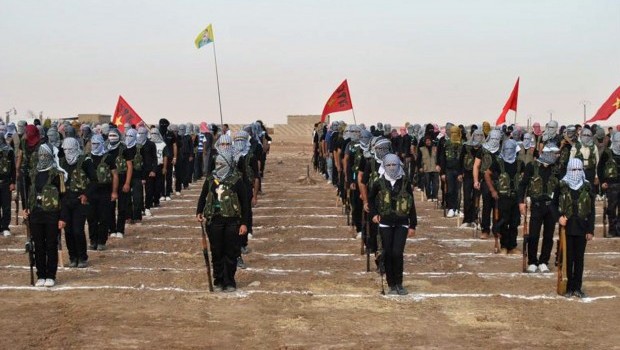
Kurdish opposition fighters attend a ceremony on July 18, 2013, in the northern Syrian border village of al Qamishli. At least 29 people have been killed in fighting between Kurdish and jihadist fighters in northern Syria in the past two days, the Syrian Observatory for Human Rights said (AFP PHOTO/STR)
The latest violence coincided with a visit by the UN-Arab League envoy to Iran, a staunch ally of President Bashar Assad’s government, to press efforts for international peace talks aimed at ending the civil war, now in its third year.
The Kurdish militiamen captured the Yaaroubiyeh post in northeast Syria after three days of clashes with several jihadist groups there, including Jabhat Al-Nusra and the Islamic State in Iraq and Syria (ISIS).
An Iraqi intelligence official confirmed that Kurdish rebels now held the crossing point—one of two main crossings with Iraq—adding that Baghdad brought reinforcements to the area to prevent any spillover of violence.
“They were heavy battles in which all types of weapons were used,” said the Iraqi official, who spoke on condition of anonymity in line with regulations. “Iraqi forces are ready to repel any attack.”
Kurdish groups control a large swath of northern Syria, and they are suspicious of Islamic groups who have moved into predominantly Kurdish areas in the chaos of the civil war. Clashes between their fighters and jihadists in northern and northeastern areas of Syria have killed hundreds of people in the past months.
The border crossing point was under government control until March when hard-line rebels captured it. Syrian rebels, particularly the hard-line groups, are believed to draw support from insurgents in Iraq. Sunni Arabs dominate both the Syrian rebel movement and the Iraqi insurgency.
The Syrian conflict, which began as a largely peaceful uprising against Assad in March 2011, has triggered a humanitarian crisis on a massive scale, killing more than 100,000 people, driving nearly 7 million more from their homes and devastating the nation’s cities and towns.
The US, the United Nations and Russia are pushing for an international peace conference to be held in Geneva next month, bringing together the warring sides. But no final date for the conference has been set and it is unclear whether the sides can reach an agreement on the agenda.
Loay Al-Mikdad, a spokesman for the rebel Free Syrian Army, said Saturday he expected the conference to be postponed. Members of the FSA command met Thursday with the UN-Arab League Special Envoy for Syria, Lakhdar Brahimi, who traveled Saturday to Tehran.
“As a result of the discussions, we felt that there is an international direction toward postponing the conference for some time,” Al-Mikdad said. Arab League officials said earlier this month that the conference would be held Nov. 23-24.
Brahimi, at a joint press conference with Iran’s Foreign Minister Mohammad Javad Zarif, said Iran’s participation in such a conference is “necessary.” Zarif said Iran would participate if it is invited.
Syrian rebels, meanwhile, denied government media reports that the head of the Nusra Front had been killed.
Friday’s one-line state media report, which could not be independently confirmed, said Abu Mohammad Al-Golani died in the coastal province of Latakia. But rebels said they had received no word of clashes in that province.
If government reports on the death of Al-Golani are correct, then the capture of the Yaarobiyeh post would be the second setback for Al-Nusra and its allies in recent days.
Al-Mikdad said Syrian rebels did not report any recent clash in Latakia province. He says his group is unsure if Al-Golani even exists.
“This is part of the regime’s lies. Our information from the ground says that this is not true and not accurate,” Mikdad said by telephone.
The Nusra Front has emerged as one of the most effective among rebel groups fighting Assad, and it has claimed responsibility for numerous suicide bombings against government targets. The US State Department put the group on its list of terrorist organizations for its connections to Al-Qaida.
In Daraa province in the south of the country, rebels captured the town of Tafas after weeks of fighting that left scores of people dead, the Britain-based Syrian Observatory for Human Rights said. Syrian state media did not report on the battle.
Also Saturday, the Observatory reported that three more women detainees were being released. They included Tal Al-Mallohi, a prominent young Syrian blogger convicted of spying for a foreign country and whose prison sentence ended two months ago.
The release would bring to 64 the number of female detainees recently freed by Syrian authorities. It is likely part of a complicated, three-way hostage swap last week brokered by Qatar and the Palestinian Authority during which Syrian rebels freed nine Lebanese Shiite Muslims while Lebanese gunmen released two Turkish pilots.
The Syrian government has not commented on the swap or the prisoner releases.
